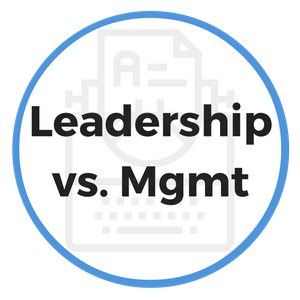- Home
- Leadership Development Articles
- Leadership Traits
Best Leadership Traits of Outstanding Leaders
The following leadership trait list provides aspiring leaders with a more specific action plan for defining one's self as a leader. The following leadership traits are based in part on teachings of the United States Marine Corp.
As you read through each leadership-based trait below it’s easy to see how these very same ideals can be applied (and should be expected) in today’s business environment.
Each of the leadership qualities discussed below can be the topic of your next team meeting as you work to develop the leadership skills of your team. As you discuss each of these qualities of leadership, share your insights and encourage your team to discuss their views in a series of team meetings.
To help guide you in your team discussions, we've provided key talking points. For each trait, read why the trait is important and then ask for team members to provide additional thoughts.
Next, ask each participant to identify how they might improve an area of their personal or professional life by adopting each trait. We've provided an example of a key lesson to help facilitate your discussions.
Finally, ask the team to provide an example of how they can apply each trait in their daily work environment. Again, an example is provided for each trait below to assist you in leading your team through each lesson.
As the leader it's your responsibility to understand that every person's leadership definition may be slightly different based on their individual values and life experiences. However, you can feel confident in knowing that the leadership traits discussed here are widely accepted as the building blocks for a strong and secure foundation for leadership development.
Remember these 14 leadership traits with the acronym JJ DID TIE BUCKLE, which we will cover in order below, or you can use the following quick links to go directly to a specific trait of interest.
Judgment | Justice | Decisiveness | Initiative | Dependability | Tact | Integrity | Endurance | Bearing | Unselfishness | Courage | Knowledge | Loyalty | Enthusiasm
Top 14 Leadership Traits
JUDGMENT
Importance: The decisions and actions taken by a leader over time will either work to build or erode his or her credibility in the eyes of team members, peers and business partners.
Key Lesson: A thoughtful response is always better than a quick or emotional reaction. People respect a leader that carefully considers the impact of his decisions. They expect a leader to be fair and consistent.
Leadership Trait Example: Remember this medical analogy. When a doctor prescribes medicine, it is your hope that you will "respond" well to the medicine. However, if you return to the doctor in a week with a terrible rash all over your body, he would say that you have had a bad "reaction" to the medicine. This is a perfect example of why leaders need to be thoughtful in their decision-making process. Your decisions will impact others, either positively or negatively. Leaders must remember to take that responsibility seriously and they do that by not overreacting with emotion or out of frustration, but by taking time to respond in a thoughtful manner.
JUSTICE
Importance: Leaders must work hard to ensure they are being viewed as impartial when it comes to reward and recognition, or when taking corrective action. Treating one employee different than another will only create animosity within the team.
Key Lesson: A leader should not be perceived as playing favorites with staff members. Doing so will degrade your credibility and create a poor work environment. Great leaders take steps to identify each team member's specific talents and contributions and take the opportunity to reward and recognize each person based on the merits.
Leadership Trait Example: Incentive plans should be based on specific and measurable outcomes compared to stated goals. This will ensure that people are rewarded based on a fair and consistent playing field.
DECISIVENESS
Importance: When a leader is indecisive, meaning he or she takes too long to make a decision, the leader may be viewed as weak, unprepared or simply incapable of living up to the responsibilities of the position.
Key Lesson: Sometimes, given all the options, no option rises above the rest. This is when leadership is critical. It takes a leader to see beyond the stated options. By looking at the broader scenario a leader understands that in order for the team to move forward - something has to move.
Leadership Trait Example: The late U.S. Army General Norman Schwarzkopf spoke about the importance of a leader making a decision. He recalled that at one point in his career he was faced with making an important decision that other leaders before him were unable to make. They suffered from "paralysis of analysis" as he put it. They couldn't determine the best course of action, so they took no action, just kept putting it off.
But something needed to be done! Considering both options carefully, General Schwarzkopf wasn't sure which option was correct either. But he understood the necessity of making a decision so that the entire team could move forward. He made his decision and confidently told him team to carry out his orders. He figured that if his decision was wrong, then they would recognize the error soon enough and make the appropriate corrections, which would at least put them on the road to progress. However, by making no decision he would simply be continuing the status quo, which in his mind was not acceptable.
"Be decisive. Right or wrong, make a decision.
The road of life is paved with flat squirrels who couldn’t make a decision."
- Unknown
INITIATIVE
Importance: Leaders notice the employee who takes on more than he is asked; who takes ownership, who steps up, and who takes action when confronted with an opportunity or challenge. Therefore, as a leader, you must do the same.
Key Lesson: Too often people allow themselves to be crippled by the assumption that they can't, shouldn't, or couldn't do something. They fear what might happen if things go wrong. That same fear handicaps them from focusing on what can, should or could happen if they take action. Taking initiative is what most people aren't willing to do. Be the person who is willing to take initiative when others won't. In doing so, you'll definitely stand out from the crowd.
Leadership Trait Example: Sara Blakely is the first female self-made billionaire. She created Spanx, which is a body smoothing garment. She did not come from money. She was not savvy to the fashion industry and how things were supposed to be done. For instance, rather than trying year after year to get an interview at an annual event that allowed a handful of select companies to pitch their new products, Blakely simply picked up the telephone and told the executive at Neman Marcus that if she would agree to meet with her and let her demonstrate her new product, she would pay her own way.
The executive was impressed and stated that if she was willing to pay her own way then she would agree to give her 10 minutes. The rest is one of the greatest business success stories is modern history.
DEPENDABILITY
Importance: Leaders must continue to learn and grow. At the point at which a leader stops growing she has, in effect, put a lid on how much she can teach and coach her team members to higher levels of performance.
Key Lesson: Experienced leaders understand that everyone is expendable. Anyone can be replaced. It doesn't matter how smart, talented or impressive you are - somebody can and will be ready to replace you the minute you begin to take your role and responsibilities for granted. Stay humble, keep reaching beyond the horizon and continue to push yourself toward new levels of performance.
Leadership Trait Example: Famous leadership author, John C. Maxwell, in his best seller The 21 Irrefutable Laws of Leadership has a special chapter that is titled, "The Law of the Lid". In this leadership example Maxwell explains that too often people obtain a leadership position and mistakenly assume that they have reached their goal of becoming a leader so they no longer need to seek out leadership advice or counsel. Nothing could be farther from the truth.
The fact is that once you actually hold a leadership position you need honest and direct feedback from more experienced leaders more than ever. Why? Because now you actually have a team that is counting on you to help teach, coach and mentor them so that one day they too will hold a position of leadership. The point at which you stop seeking opportunities for growth and development you have in effect capped your capacity to further develop your team. Never put a lid on personal and professional growth and development.
TACT
Importance: The ability to communicate to people in a way that is not threatening or judgmental. Giving people a sense that you are looking at all sides of an issue with an intention for finding the best answer for everyone involved.
Key Lesson: Dealing with people in a caring, thoughtful and diplomatic way ensures that all parties are treated fairly - based on the facts. Too often leaders can rush to judgment only to find out later they were wrong because they didn't take the time to get all the facts before rendering a decision. Communicating in a tactful way demonstrates to others that you are an experienced and effective leader.
Leadership Trait Example: Whenever a leader needs to address a sensitive subject with an employee he should do so in a private setting. Using the utmost discretion not to place blame (E.g. "Why did you do that?"), but instead to seek to understand all sides of an issue (E.g., "Help me understand how that happened.") before taking action will help to ensure all parties feel supported by management. Good leaders know that when communicated correctly you can have any discussion, no matter how difficult the subject matter, without making the employee feel like it's personal.
"Ability is important in our quest for success, but dependability is critical."
- Zig Ziglar
INTEGRITY
Importance: A leader's word is everything. You cannot lead people effectively if they do not trust you. This requires a leader to be consistent in words and deeds. This one leadership trait ranks above all others. Leaders must act with integrity.
Key Lesson: Often when a person leaves a company it's not the company they are choosing to leave - it's the leader they are choosing to leave. Leaders must assume that every night at the dinner table their employees are talking about them at some point. The question is, what are they saying about their leader? Do they respect their leader or don't they? A leader's reputation is built over time and every communication or action taken by the leader can have a far-reaching impact in the eyes of team members. Remember the impact, positive or negative, that your words and actions can have on your team members and make every effort to deserve their respect.
Leadership Trait Example: Leaders must be careful to treat all employees fairly and equally. For instance, if you have an employee you trust and you share details of an issue you are having with one of their co-workers, your employee might wonder what you are saying about him to his co-workers. As a result, the leader is creating doubt and distrust with the people he trusts the most, thereby eroding his credibility. Instead, a leader must work hard to protect his reputation in the eyes of his entire team.
ENDURANCE
Importance: One thing that is always constant in this world is change. So, a leader must not only be open to change, but must expect it and embrace it when it comes. Having the physical and mental endurance to face hard times and convince others to do the same is a key leadership trait.
Key Lesson: Leaders must be viewed as someone with a strong conviction. When times get tough a leader must work to ensure that no one takes their eye off the ball. When there is stress or anxiety in the workplace the leader needs to be visible, front and center, demonstrating to others what is expected from every member of the team.
Leadership Trait Example: Former New York City Mayor, Rudy Giuliani was faced with an unthinkable situation when two planes knocked down the Twin Towers. Most people recall where they were when that tragedy unfolded. Most will also remember seeing the Mayor on TV at ground zero, front and center, leading the recovery efforts; attending all the funerals, and helping his community to heal for months, even years after the horrific event. Mayor Giuliani knew that he must endure so that the citizens of his beloved city would come back better and stronger than ever before.
BEARING
Importance: Leaders should be mindful of how others view them. This includes how they walk, talk and dress. How a leader carries himself is important, particularly during tough times or a crisis situation.
Key Lesson: In many ways, perception is reality. Great leaders know this and they make great efforts to ensure they are viewed in the proper light so they can be most effective. In order for a leader to maintain his influence, he must effectively manage the perception of others.
Leadership Trait Example: After President Reagan was shot and taken to a nearby hospital, he knew that as the President of the United States he needed to do everything possible to assure the American people and other world powers that he was still in charge. He famously joked with hospital staff as they were wheeling him into surgery, "Well I hope you are all Republicans." Of course his comment was shared with the world media and was very effective in helping everyone to believe he was alright and would quickly recover. Only much later did we find out how close the President came to dying on that memorable day.
"Endurance is one of the most difficult disciplines, but it is to the one who endures that the final victory comes."
- Gautama Buddha
UNSELFISHNESS
Importance: Great leaders are quick to praise their team members and they make every effort to praise in public. However, when results are not achieved these leaders hold themselves accountable and they are quick to take ownership for their part of the failure. Great leaders are quick to take the blame, and always share the glory.
Key Lesson: Leaders must see the bigger picture when a team member is in need. Whether the person is dealing with a family situation, physical ailment or emotional issue, a good leader will work to support that person to the best of their ability. Of course this must be balanced with the larger mission of the organization, but a good leader will find a workable solution if one is available.
Leadership Trait Example: Leaders too often make the mistake of not being giving of their time. The truth is that time is precious so it's understandable that some leaders will guard their time carefully. But in the minds of your employees, the time you invest in them is invaluable. When leaders focus their time on the people they lead they create a connection that is unbreakable. So, the leadership trait of unselfishness should not be ignored. Do not be selfish with your time when it comes to your team members. Always maintain an open door policy and encourage team members to come to you any time they need assistance. Leaders still need to use time wisely. Time invested should never be confused with wasting time on matters of little importance to the team member or the mission of the organization.
COURAGE
Importance: Demonstrating courage in the face of adversity is one of the key differences between being a manager and a leader. Leadership requires you to take a stand at times on matters important to the team and the organization. A principled leader is also prepared to handle any potential fallout.
Key Lesson: Highly effective leaders are principled leaders. They demonstrate courage under stressful times and they are willing to take calculated risks to stand by their convictions. They believe that in the long run - right makes might.
Leadership Trait Example: Courage is not just required in life and death situations. Some leaders demonstrate courage when they approve an exception to a company policy because in that specific situation it makes sense and is the right thing to do. However, one historical example of a courageous leader is Nelson Mandela, who for 27 years was imprisoned in an African jail, yet he stayed true to his convictions and rose to become the President of his nation. He then reached out to his former captors/political leaders and was instrumental in leading the fight against Apartheid.
KNOWLEDGE
Importance: For a leader to be credible, you must be competent in your field. You must have the knowledge, experience and capacity for leading a successful team, or you don't deserve to be in a leadership role. Bottom line, be prepared and always do your homework.
Key Lesson: The more knowledgeable your entire team is the more successful your team will be. Great leaders hire people that will enhance the capabilities of the entire team. Hire to your weaknesses and work to create the best team possible. The leader isn't always the smartest person in the room, but the leader should be the one who is most able to create and develop the best team possible.
Leadership Trait Example: It's easy to think of smart people such as Bill Gates or Steve Jobs when the subject of knowledge is discussed - technical knowledge to be more specific. However, both of these leaders were admittedly unkind and downright mean to their employees at times. As they matured they realized the errors of their ways and softened their approach. Knowledge of human behavior is just as important to an effective leader than technical knowledge. Knowledge of people is critical to long term success and personal fulfillment. Take care of your people and they will take care of you.
LOYALTY
Importance: Without people willfully following you, you are not a leader. Loyalty can only be earned and it will take time and effort for any leader to gain the respect and loyalty of team members.
Key Lesson: Team members need to know that their leader has their back. For an employee to feel loyal to their leader, they need to be confident that the leader is also loyal to them.
Leadership Trait Example: I've often told my employees, "Your best effort will always be good enough for me." The caveat to this, of course, is that they truly need to be making their best effort and there needs to be incremental improvement in their results. If this is the case, then it's just a matter of time before the goals are achieved. With this kind of support from management, employees understand they have a leader that is truly committed to their success, even if it takes just a little bit longer to achieve their goals.
ENTHUSIASM
Importance: Everything positive is enhanced when it's fueled with a positive environment that is full of enthusiastic people. Positive energy must be expected from every member of the team and must be demonstrated by the leader at all times.
Key Lesson: Leaders do not afford themselves the luxury of having a bad day in public. They understand that being negative is a selfish act - it helps and supports no one. Therefore, a positive environment must be expected and managed closely.
Leadership Trait Example: A team cannot gain momentum and become the best they can be without the power of enthusiasm - from employees and members of leadership. There is a tremendous advantage given to the team, department or company that can leverage the energy of the people involved. Sir Richard Branson, founder of Virgin Records, is famous for exhibiting the leadership trait of enthusiasm. He created huge promotional events where he would dress up and create memorable experiences that would help to create excitement for his products in the marketplace. Branson worked the crowd just as well as P.T. Barnum did during his circus events. Great leaders understand that in order to have an enthusiastic team, the leader needs to lead the effort by consistently demonstrating enthusiasm in the workplace.
These are the 14 leadership traits taught in the United States Marine Corp. handbook. Remember, the acronym JJ DID TIE BUCKLE and you'll never forget these important traits for leadership development.





